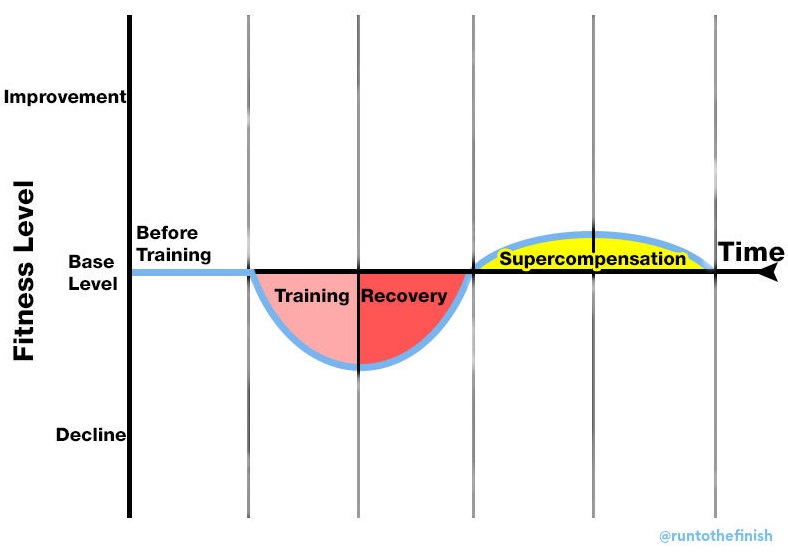As race day gets closer, you’re starting to worry if your longest long run is long enough. Wondering if 10 miles is a long run? Do you need to run more than 20 miles? How far should you run before a marathon or a half marathon is an important question. Right alongside, should you limit your long run to 3 hours! As a longtime running coach, I spend a lot of time talking you out of doing MORE than you should. Which might not be what you’d expect to hear, but it’s true. Doing more often mentally makes us feel better, but at the expense of our performance.
As a longtime running coach, I spend a lot of time talking you out of doing MORE than you should. Which might not be what you’d expect to hear, but it’s true. Doing more often mentally makes us feel better, but at the expense of our performance.
Today we’re going to dive in to the distances you need to complete and why they’re enough. How far you run before a half marathon or how far you run before a marathon are dependent on a wide variety of factors.
Plus we’re going to bust some myths like you can’t run over 3 hours!
We’re going to tackle this question for both distances because you’ll see a lot of overlap!
How Long Should Your Longest Long Run Be?
The majority of half marathon training plans for beginners will top out at 10 miles and for marathon runners 18-20 miles. Does that mean it’s the longest long run you should do? Generally, yes.
The reasons that running coaches so often recommend you follow a plan from start to finish is that they all build towards peak runs slightly differently.
I’ve compared the top marathon training plans here.
- You can see that while the Hanson Method might recommend only a 16 mile long, it’s based on high mileage and high intensity the rest of the week. You run that long run at goal pace on tired legs.
- Meanwhile a Walking Marathon Training Plan may focus on a long walk day of 4-5 hours rather than a specific distance.
- Advanced marathon training plans will often contain 22 and possibly even 24 mile long runs.
Can Your Long Run Be Over 3 Hours?
Yes. As noted above there are situations where you will absolutely need to practice being on your feet for longer than three hours. This is an unfortunate commonly relayed message that isn’t backed in studies.
It was originally from Jack Daniels, who is a great coach, but worked largely with elite level runners. And what they cover in 3 hours is vastly different from the runner averaging 12-15 min miles.
A big number of runners will be doing 3:30-4 hour long runs, run/walkers and walkers may absolutely be out there for over 4 hours.
This is NOT to say you should force your long run to be longer than 3 hours just because you can. Follow the plan that guides you through what is best for your goals and your body.
In fact, this is such a big topic that I wanted to provide you with more science and more data to make your own informed choice!! Run Coach Laura Norris and I chatted about this on our podcast Tread Lightly.
Should You Run 26 Miles Before a Marathon?
No. Hard stop unless you’re a long time runner who is also training for an ultramarathon or potentially an Olympic Qualifier. Though honestly while elite runners hit huge 100 mile weeks, they are rarely running 26.2 in the training for a goal race.
The reason we do not run 26.2 miles prior to the race is the amount of time it takes to recover from this long run.
That recovery time can impact the quality of your next run and set you up for injury if you don’t do enough easy days or take time off.
Should You Run 13 Miles Before a Half Marathon?
Now we start to see a little bit of a change in the answer because for experienced runners it’s a definite possibility, while for first time half marathon runners it’s a NO WAY.
Long time runners aiming for a half marathon PR may run up to 16 miles. This is what I have done myself in the past and what works for many athletes working for 1:40 and faster races.
NOT REQUIRED, but it does work for some athletes. This is largely because you’ve pushed your endurance a bit farther and then there is a mental component to knowing that on race day you don’t need to go as far so you feel more confident picking up the pace.
For a first time half marathon save that HUGE milestone for race day! Don’t freakout about not having covered the full distance in training.
Again this is why you follow a good beginner half marathon training plan.
- During training you are building your total endurance
- Each week you are running on slightly fatigued legs from the distance and any speed work
- After your longest run (roughly 10 miles for first timers), you go in to taper
- During taper for a race, your body has time to fully recover
- Race day sees your muscles filled with glycogen and in peak shape to perform.
- Plus you get the added bonus of race day adrenaline which will carry you so much farther than you know!
This graph is a great visual of how recovery helps you to slingshot past your current level of fitness when used correctly.

How Far Do You Need to Run Before a Marathon?
Let’s break this down a little bit more to help you understand what the longest run of your training should look like.
Here are the factors we want to take in to consideration:
Experience Level
How long have you be running? Is this your first marathon? If so we want to err on the side of a more conservative long run to avoid any injuries that will prevent you from making it to the start line.
More experienced runners are often going to be doing more or longer runs. And by experienced we don’t mean you’ve run 1 marathon, we actually mean that you’ve been running for years without injury and you know how your body responds to long runs.
Your Pace
Instead of focusing on the mileage for a long run, most runners should be considering total time on feet. In fact, it’s why many of the long runs I prescribe have a run period followed by a few miles of walking.
Total time on feet matters.
Coach Greg McMillian uses the following formula for runners under a 5:00 marathon:
Maximum long run = [Marathon time – 30 minutes] up to [marathon time + 15 minutes]
In other words if your marathon goal time is 4:00 then you might do a long run of 3:30 to 4:30 hours. While this top end is unlikely to be on most training plans for a 4 hour runner, it’s one method that actually takes pace in to account.
Simply saying 20 miles should be your long run might not be accurate if it takes you 5 hours. We’d still cap your time on feet at 4:30 in most cases and less in others based on additional factors.
Injury or Illness History
Some runners simply tend to get injured more easily. Could be due to genetics, running gait, lack of strength training or the classic training mistakes: too much, too soon, too fast.
Either way if you have found yourself plagued in the past with getting injured or sick during marathon training it pays to be more conservative with the long run.
In this case, you may find a bigger benefit from doing a long run that maxes out at 16 miles and then doing 8-10 miles the day after. This is similar to how many ultra runners train. It reduces the stress of the full long run and forces you to practice doing a decent run on tired legs the following day.

Remember that every training cycle and run will be different. Which means you may need to adjust the duration of your long run due to life, running in the heat and humidity or a shift in goals.
Don’t expect them to all feel good.
I love this statement that about 1/3 of your training should be fun, 1/3 should feel hard and 1/3 should be easy. It’s a reminder that it changes and learning to embrace the hard helps on race day.
When Should You Do Your Longest Marathon Run?
After months of slowly building up your mileage, the biggest long run for the marathon or half marathon should be TWO weeks from race day.
Old school training plans used 3 weeks, but nearly every running coach I know now agrees with the experience I’ve seen in our athletes of a two week taper.
That means two weekends before your race you will do your big run on Saturday or Sunday and then begin to taper. The week before your race your long run will probably be 8-10 miles for the marathon and 6-8 for the half marathon.
How Many 20 Milers Should I Run?
Now that we’ve convinced you 20 miles is plenty for the long run, the question turns to how often should you run them.
First time marathon runners will likely only do 1 run of 20 miles during peak week. You will probably also only do 1 run of 18-19 miles. The goal is simply to build your capacity for running long, nothing more.
Experienced runners who are aiming for a Boston Qualifying time, will likely have a couple of 20 mile long runs, plus 18 mile runs that include goal marathon pace miles.
What’s the Shortest Long Run To Run A Marathon?
As a coach I always hate this question because it’s usually a signal that you haven’t done enough training, but are determined to do the race and either hate it or get injured.
I would say no less than 16 miles, assuming you haven’t been following the Hanson Method.
Running a half marathon might make you feel like the marathon is absolutely doable and so you pick one out in just a few months. I love the enthusiasm, but trust me once you hit 18 miles it feels like a whole different thing than the half marathon.
Your bones, ligaments and tendons need time to adapt to longer distances.
Additional training resources:
Other ways to connect with Amanda
Instagram Daily Fun: RunToTheFinish
Facebook Community Chatter: RunToTheFinish
Sign Up to Receive a Weekly Newsletter with Top Running Tips and Laughs


